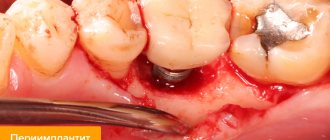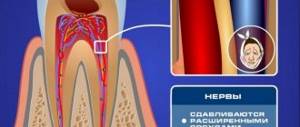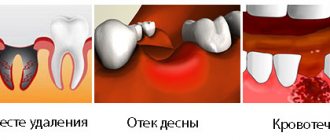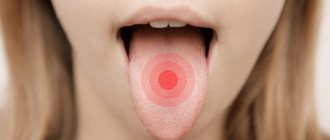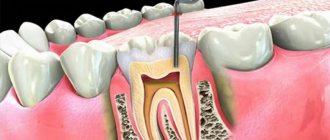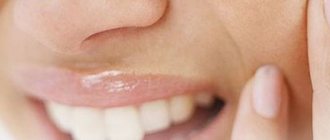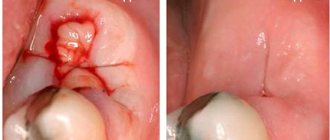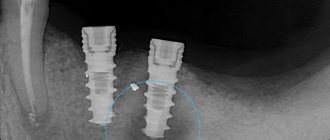Content:
- Why does a tooth hurt after implantation - the most common reasons
- Ways to minimize pain after implantation
- Causes of pain
- If the implant hurts after a year
- How to get rid of pain
- Memo for patients after implantation
Implantation of an implant is a rather complex surgical procedure, so even if the operation was performed correctly, the patient may still suffer for some time due to painful symptoms.
As a rule, pain makes itself felt immediately after the anesthesia wears off. In some situations, pain after dental implantation is normal, in others it is not. It is important not to guess whether everything is okay, but to immediately contact the dentist. The doctor will conduct an examination and tell you whether you should worry about discomfort.
Why does a tooth hurt after implantation - the most common reasons
Discomfort after distal rod placement can manifest itself in a variety of ways. Most often it is dull and aching in nature, reminiscent of those unpleasant sensations that persist for some time after tooth extraction. Some people complain of severe itching in the injured gum area.
It is important to be alert if it seems that the soft tissues are pulsating, there is a pronounced feeling of their distension. It is especially dangerous if the painful symptoms are radiating, that is, they spread to other parts of the oral cavity.
Average cost in Moscow
Cost of medications for home treatment
| Name of service | Cost, rub. |
| Ointments and gels | |
| Chlorhexidine | 16 |
| Betadine solution 10% 120 ml | 280 |
| Solcoseryl | 370 |
| Folk remedies | |
| Chamomile flowers | 60 |
| Harvesting plantain | 70 |
| Calendula flowers | 110 |
| Fish fat | 140 |
| Sea buckthorn oil | 220 |
| Propolis tincture | 300 |
| Anti-inflammatory and painkillers | |
| Analgin | 50 |
| Voltaren | 230 |
| Amoxiclav | 310 |
| Nimesil | 700 |
Cost of treatment of complications in dentistry
| Name of service | Cost, rub. |
| Specialist consultations | |
| Dentist | 600 |
| Periodontologist | 740 |
| Implantologist | 820 |
| Treatment | |
| Removing dental plaque in the area of one tooth | 180 |
| Periodontal applications in the area of one tooth | 370 |
| Application of a protective periodontal bandage | 400 |
| Laser therapy of the gum mucosa | 490 |
| Implant removal | 6900 |
| Implantation of osteoconductive material in the area of one tooth | 10900 |
| Implantation of a protective membrane | 12900 |
Ways to minimize pain after implantation
Typically, the severity of pain after surgery directly depends on the characteristics of the technique used by the implantologist. Often, in order to increase a person’s comfort during the rehabilitation period, doctors prefer a technique that combines the removal of a diseased tooth and the implantation of a titanium pin.
In this case, the patient does not have to go through the recovery period twice, be exposed to stress twice, and undergo anesthesia twice. Also, with this method, regenerative processes proceed better - the doctor does not have to make additional incisions when installing the pin.
It is good if during the operation a laser beam is used instead of a scalpel. Then healing occurs faster, the likelihood of postoperative inflammation is significantly reduced, and swelling goes away faster.
Why complications may occur
To minimize the risk of complications, the doctor must make sure that implantation is not contraindicated and the patient’s body can bear the load. There are relative and absolute contraindications.
Relative contraindications are:
Bad habits significantly increase the risk of complications
- pregnancy, lactation;
- treatment with hormones, chemotherapy;
- age over 60 years;
- bad habits;
- type 2 diabetes mellitus;
- jaw injuries;
- cariogenic situation in the oral cavity;
- chronic diseases.
Installation of implants in these cases may have a long recovery period. The pain may persist for several weeks.
Difficult implantation is also observed in the case of:
- non-compliance with installation technology;
- lack of proper oral care in the postoperative period;
- refusal of therapy during rehabilitation.
Implantation is not possible if:
- HIV infections;
- chronic diseases of bone and connective tissue;
- blood diseases;
- oncology;
- diseases of the lungs, kidneys, liver;
- endocrine diseases.
The absence of contraindications does not guarantee the absence of complications. The qualifications of the doctor play a huge role. A competent specialist will promptly eliminate any complications that arise and prevent their development.
Causes of pain
Severe pain during implant healing may be due to:
- Mistakes made by the doctor. It is very important to trust your oral health to an experienced implantologist. You should not skimp on choosing a dental clinic and doctor. Illiterate selection of medical instruments and equipment, violation of the rules of asepsis and antisepsis, improper preparation for surgical procedures or its complete absence, refusal to perform bone grafting in cases of severe bone tissue deficiency, traumatic actions during prosthetics - all these are factors directly related to the activities of the implantologist. And they are the ones that can lead to pain during the rehabilitation period.
- Incorrect behavior of the patient. It is very important that a person strictly follows all medical instructions and carries out the appointments. It is unacceptable to eat solid food until the implant has taken root well. You should not take medications thoughtlessly. It is prohibited to drink alcohol-containing drinks. Under no circumstances should you visit a sauna or bathhouse in the first month after implant installation.
- Opening of bleeding during implantation of a titanium root. This sometimes happens if the patient’s blood pressure has sharply increased or tachycardia has developed against the background of excitement.
- Violation of the integrity of the maxillary sinus. It only happens when you work carelessly with the upper teeth. In this case, the integrity of the nerve endings is damaged, which negatively affects recovery.
- Formation of an extensive hematoma. Then it puts pressure on the nerves and blocks conductive impulses. As a result, recovery processes cannot proceed normally in the operated area.
Pain during recovery
After the anesthesia wears off, the patient may feel some discomfort and aching pain in the jaw, throat, head, and temporal region.
The recovery period, and therefore the duration of pain, is different for all patients and depends on the following factors:
- Number and type of implants implanted (single pin, All-on-4 system, long zygomatic implants);
- Difficulties of the operation (simultaneously with the installation of implants, bone grafting and sinus lifting of the upper jaw can be performed);
- Individual characteristics of the patient and pain threshold.
Important!
If we talk about pain after implantation, it is considered normal if it lasts no more than 10 days after surgery and its intensity weakens every day.
1-5 days after surgery
The pain may increase in the first few days after surgery. There is swelling and the surgical wound bleeds a little. On days 2-3, the operated area may appear blue; some patients complain of headaches, sore throat, and facial muscle tension.
All these phenomena are absolutely normal and indicate the recovery of the body after surgery. Usually by day 5 the patient feels much better.
5-10 days after surgery
During this period, the gums may still ache and there may be discomfort in the area of the zygomatic muscles, but by 10-12 days all these symptoms disappear completely.
| Attention: If 10-14 days after installation of the implant the pain does not go away or intensifies, swelling and fever appear, consult a doctor immediately. An infection may have set in and treatment is needed. |
A few months after implant placement
Some patients have a normal recovery period, but suddenly experience severe pain a few months after implantation.
This may happen for the following reasons:
- Loosening of the temporary crown plug or abutment. During the healing period, the patient can have a plug installed or, in case of one-stage implantation, a plastic crown on a temporary abutment. These structures can sometimes become loose, causing injury to the gums and causing discomfort and pain. This situation is not dangerous, but it is important to contact an implantologist on the same or the next day. The doctor will carefully remove the loose structure, wash it and put it in place.
- Rejection of the implant by the body. The process of osseointegration of the pin continues for several months, during which there is also a slight risk of rejection of the structure. This happens very rarely - in 1% of cases and requires removal of the artificial root.
Other causes of delayed pain include:
- Inflammatory process in the gums.
- Damage to the maxillary sinus or mandibular nerve due to bone resorption in the implant area.
If the implant hurts after a year
Dentists rarely encounter unusual situations when toothache in the implant area occurs only a year after the intervention. Then we are talking about long-term negative consequences of previous treatment, such as:
- Peri-implantitis . Inflammation occurs along the perimeter of the implanted titanium pin. The problem arises if the doctor violated the basic rules of prosthetics or if the patient did not pay due attention to dental care. The infection affects hard and soft tissues and leads to bone resorption. If timely treatment is not carried out, the dental implant will be rejected.
- Rejection of a titanium pin. This doesn't happen often. The fact that the body is rejecting the implant can be understood by the following signs: increased body temperature, swelling in the area of the artificial tooth, loosening and mobility of the prosthesis, separation of pus from the gums.
Both described reasons require urgent receipt of qualified dental care. These are not situations where you can delay treatment.
How to get rid of pain
Methods for eliminating pain can be different - it all depends on the diagnosis and the cause of the problem. To create an effective therapeutic regimen. The doctor conducts an examination and takes pictures. When the situation becomes clearer, the patient may be offered one of the following treatment options:
- Carrying out professional oral hygiene, taking anti-inflammatory drugs, antibiotics.
- Carrying out therapeutic rinses using antiseptics and anti-inflammatory solutions. Treatment of the affected area with wound-healing gels and ointments.
- Applying compresses to the inflamed area.
- Taking painkillers based on paracetamol, nimesulide, ketorolac.
- Carrying out sinus lift surgery. It is needed if the maxillary sinus was accidentally damaged during implantation.
If the inflammation is very severe, the pin is rejected, and surgery to remove it may be required. Subsequently, when the gums have healed, the patient is offered another prosthetic option or the implant is re-installed.
What to do if there is aching or sharp pain and swelling
Dull aching pain for a short time in the postoperative period is normal. To alleviate it and prevent the development of acute pain, you need to follow the following recommendations:
- Apply cold compresses. A cold pack is applied to the side where the operation was performed at intervals of 20 minutes. A break is necessary to prevent hypothermia. Cold application can be carried out within one and a half days after surgery.
- Wipe soft tissues with a special solution. You need to make it yourself from: 1 tsp. salt, five drops of iodine, 200 ml of water.
- You can take a painkiller 2 hours after surgery. The permissible interval between doses of analgesics is 4 hours.
- Maintain oral hygiene to avoid infection. When brushing your teeth, do not touch the implantation site with a brush, but wipe with a cotton swab and saline solution.
- Temporarily avoid solid, hot, spicy foods.
Acute pain indicates inflammation and requires urgent medical attention.
Pharmacy medicines
To relieve swelling from soft tissues, the following is prescribed:
- Chlorhexidine bigluconate 0.5% . Rinse the mouth with the solution up to six times a day for several days.
- Betadine 10 % Use 6 drops of solution for external use per glass of water. Rinsing is carried out according to the scheme of the first drug.
- Solcoseryl . Dental paste is applied to the wound after rinsing. It provides wound protection, pain relief, and promotes healing. The paste can be used by expectant mothers.
- Antibiotics . Amoxiclav, Flemoklav, Augmentin have an antimicrobial effect and stop the spread of infection. Prescribe one tablet twice a day for five days.
- Nonsteroidal anti-inflammatory drugs . Nimesulide, Analgin, Voltaren, Ketanov are taken if the implantation site and the areas around it hurt.
Drugs that relieve pain and reduce fever do not require systematic administration.
Folk recipes
The following medications can help minimize pain and relieve swelling:
- Kefir . Rinsing with kefir is repeated every three hours for a week.
- Sea buckthorn oil and vitamin A. The drugs are applied to the gums and promote wound healing.
- Chamomile infusion . The collection is brewed, allowed to brew and rinsed in the mouth. A glass of boiling water requires 1 teaspoon of the plant. You can brew chamomile and calendula flowers in equal proportions. This mixture is boiled for 15 minutes.
- Propolis-based ointment . The drug is applied to the gums and left. It disinfects well and relieves inflammation.
- Decoction of echinacea and eucalyptus . Rinse every 5 hours. Take a tablespoon of the mixture per glass of water. The mixture is boiled for 15-20 minutes.
- Fish oil, flaxseed oil . Products containing Omega 3 fatty acids help restore gums.
- Aloe leaf pulp . A fresh leaf is crushed, wrapped in a bandage and applied to the gum.
- Plantain . Used as a compress from crushed leaves, as a decoction for rinsing. The dry plant is poured with water, boiled for 15-20 minutes, cooled and rinsed.
- Calendula . Rinse the mouth with an infused decoction of calendula 3 times a day.
Memo for patients after implantation
There are fairly simple rules that reduce the likelihood of postoperative complications. Anyone planning to install an implant should know about them:
- In the first few days, pain is normal. If it is very strong, you need to take painkillers prescribed by your doctor.
- In the first week after surgery, it is important to avoid overheating and hypothermia.
- From the first to the seventh day after implantation, you should eat only soft and liquid foods. It should not be too cold or hot.
- For the speedy healing of gums, you need to maintain oral hygiene. It is better to use a new brush with soft bristles. Do not rub in the implantation area.
- It is forbidden to rinse your mouth vigorously. For speedy healing, doctors recommend so-called oral baths. During them, the patient takes an anti-inflammatory solution into the cheek and calmly holds it for several minutes. Then he spits and repeats the procedure from the beginning.
- In order to recognize complications in time, in the first week after dental surgery you need to measure your body temperature in the morning and evening.
- Do not smoke for two weeks after implantation.
People who take a responsible approach to the rehabilitation period are much less likely to encounter postoperative complications.

